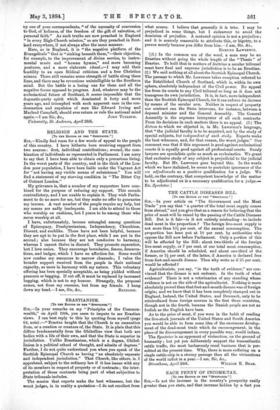THE CATTLE DISEASES BILL.
[To THR EDITOR Or THE " &ROTATOR.")
Sra,—In your article on "The Government and the Meat Trade" you say that "a quarter of the total meat supply comes from abroad," and you give that as a reason for believing that the price of meat will be raised by the passing of the Cattle Diseases Bill. But is it fair—is it not entirely misleading—to include dead meat in the proportion ? The foreign live-meat supply is not more than 101 per cent. of the annual consumption. The proportion has been put at 10 per cent. by authorities who oppose the Bill now before Parliament. Only a portion of this will be affected by the Bill: about two-thirds of the foreign live-meat supply, or 7 per cent. of our total meat consumption,
if America should be scheduled, and about one.third of the former, or 3t per cent. of the latter, if America is declared free from foot-and-mouth disease. Then why write as if 25 per cent. would be affected?.
Agriculturists, you say, "in the teeth of evidence," are con- vinced that the disease is not endemic. In the teeth of what evidence? There is not a veterinarian of any standing whose evidence is not on the side of the agriculturist. Nothing is more absolutely proved than that foot-and-month disease was of foreign origin; and we know that it has been completely stamped out in England, Ireland, the United States, and Denmark, only to be reintroduced from foreign sources in the first three countries, though not in the fourth, because the Danish people are not as foolish as the English have been.
As to the price of meat, if you were in the habit of reading the live-stock journals of the United States and South America you would be able to form some idea of the enormous develop- ment of the dead-meat trade which its encouragement, in the place of its discouragement in every possible way, would induce.
The Spectator is an opponent of vivisection, on the ground of humanity ; but yet you deliberately support the transatlantic cattle traffic, the most barbarously cruel business that is per- mitted at the present, time. Why, there is more suffering on a. single cattle-ship in a stormy passage than all the vivimections of the world inflict in a year.—I am, Sir, &c.,


































 Previous page
Previous page